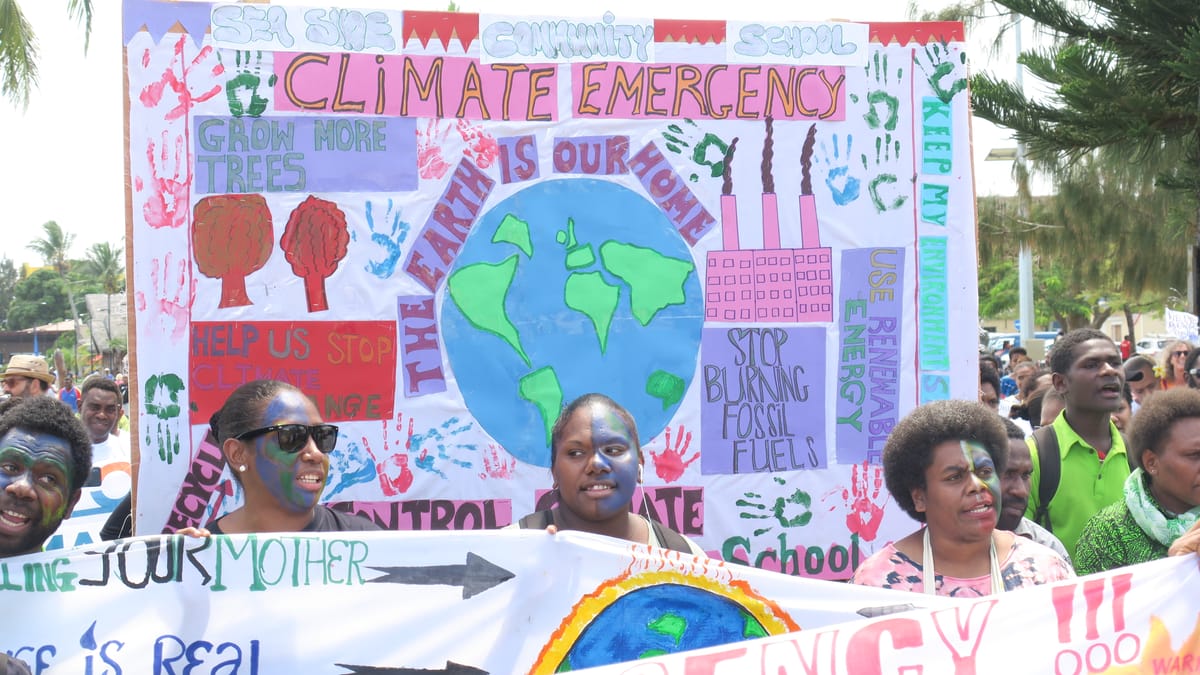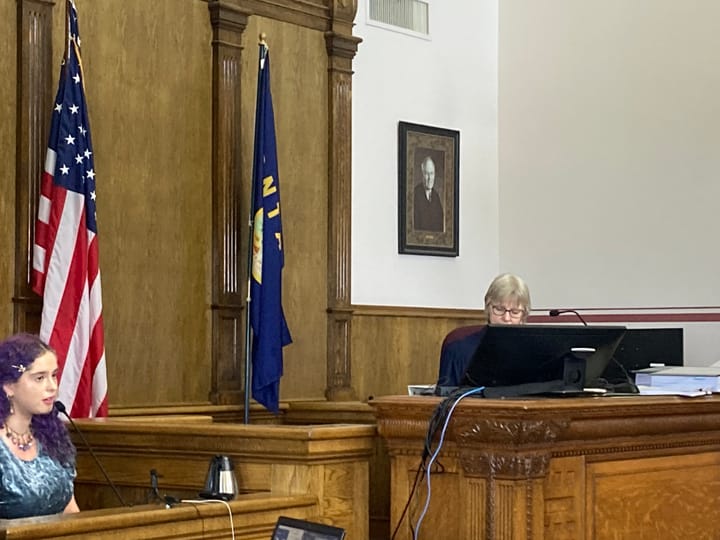A "Turning Point": How International Courts Are Addressing The Climate Emergency

Co-published with One Earth Now
The climate crisis is the single greatest global public health threat of this century, health professionals say. Human rights experts warn it poses an unprecedented risk to human rights. For the world’s poor and most vulnerable people and communities on the frontlines of climate impacts like rising seas, it is an existential crisis threatening their very survival.
Yet the global response to what scientists say is undoubtedly a global emergency has fallen woefully short, through a United Nations governance framework that essentially rests upon voluntary pledges that nations of the world submit – called Nationally Determined Contributions – to reduce their greenhouse gas emissions. Last year, leading climate experts wrote to top UN officials calling for reform of the international climate negotiations, arguing that the “current structure simply cannot deliver the change at exponential speed and scale, which is essential to ensure a safe climate landing for humanity.”
Amidst this backdrop, some of the world’s most climate-vulnerable nations and peoples are turning to international courts, seeking clarity on countries’ legal obligations to prevent climate harms under existing authorities such as the UN Charter and human rights conventions. The answers and guidance from these courts, climate justice advocates say, can help bolster accountability efforts and reshape understanding of the law and what it requires of states in the context of the climate emergency.
“As climate impacts intensify and major polluters resist accountability, those most affected by the climate crisis are increasingly turning to courts as a vital battleground for justice,” said Joie Chowdhury, senior attorney at the Center for International Environmental Law (CIEL). “International, regional and national courts can play an essential role to help governments understand and fulfill their legal responsibilities.”
On May 2, African civil society organizations filed a petition to the continent’s highest human rights court, the African Court on Human and Peoples’ Rights, requesting an advisory opinion on the human rights obligations of African states in the context of climate change. It is the first time this court is being asked to address the climate crisis, and legal experts and climate activists say it could mark a transformational moment for African jurisprudence on climate justice and intergenerational equity.
“Africa, which contributes only a small fraction of global greenhouse gas emissions, is facing overwhelming challenges due to the climate crisis,” Alfred Brownell, lead campaigner of the African Climate Platform – one of the groups behind the petition – said in a statement. “Recognizing the urgency of this situation, we are launching this petition as a heartfelt plea for justice for the communities enduring these harsh realities. Our mission is to put in place strong protective measures against environmental harm, ensuring that the dignity and resilience of the millions of Africans confronting these challenges are upheld.”
The petition addresses principles such as the protection of vulnerable population groups; states’ duties to safeguard rights to life, health, housing, food, water, and a healthy environment; and accountability of multinational corporations and historical polluters. It comes at a time when construction is underway of the nearly 900-mile East African Crude Oil Pipeline (EACOP), the longest heated oil pipeline in the world, that will run through Uganda and Tanzania and unleash millions of tons of carbon emissions each year throughout its lifespan.
Africa’s Court on Human and Peoples’ Rights, located in Arusha, Tanzania, is one of three regional human rights courts in the world, and all of them are now being called upon to weigh in on the matter of climate justice.
In Europe, the European Court of Human Rights issued a historic ruling last year in a climate accountability lawsuit brought by a group of elder Swiss women against their national government. The court found that Switzerland’s insufficient climate policies amount to a breach of its obligations under Article 8 (right to private and family life) of the European Convention on Human Rights. It was the first time that an international court found that a country’s inadequate climate change response violates human rights law.
The Inter-American Court of Human Rights, based in Costa Rica, will soon be issuing its own climate change advisory opinion. In 2023, Colombia and Chile submitted a request for an advisory opinion to the court, seeking to clarify the scope of state obligations to address the climate emergency under international human rights law, particularly the American Convention on Human Rights. The request posed a series of questions for the court to address regarding human rights obligations in the climate change context, such as rights of children and environmental defenders. Hearings were held in April and May of last year, where the court heard powerful testimonies from Indigenous Peoples, impacted communities, civil society organizations, and others, and the opinion is expected to come this year.
The Inter-American Court’s opinion will be a significant guidepost for climate justice in the region. As CIEL explains in a blog post: “The content of the opinion will likely inform the creation of public policy and serve as a blueprint for climate litigation cases at the local, regional, and national levels, and has truly transformative potential.”
“Critical Moment for Small Island States”
Another climate change advisory opinion came out last year from the UN ‘ocean court’ that unequivocally stated that countries are obligated to reduce greenhouse gas emissions in order to protect the marine environment. On May 21, 2024, the International Tribunal for the Law of the Sea (ITLOS) issued a groundbreaking opinion finding that anthropogenic greenhouse gas emissions contribute to ocean pollution, and therefore, countries must take “all necessary measures” to mitigate this pollution by curbing emissions. Developed in response to a request from a coalition of nine small island states, the advisory opinion clarified that climate action is a legal duty, and it interpreted states’ legal obligations in this context under the UN Convention on the Law of the Sea, a legally-binding oceans protection treaty ratified by 169 nations (the US has not ratified it).
Officials from small island states, which are particularly impacted by rising seas as well as ocean acidification and loss of coral reefs, welcomed the strong advisory opinion from ITLOS. “It spells out the legally binding obligations of all States to protect the marine environment; to protect us against the existential threats posed by climate change. This is a historic moment for small island developing nations in their quest for climate justice,” Tuvalu High Commissioner to Fiji H.E. Eselealofa Apinelu said in a press release last year.
“This is a critical moment for small island states and all ocean-dependent communities,” Ralph Regenvanu, a climate change and environment minister from the Republic of Vanuatu, told reporters during a press conference on Tuesday. Vanuatu has led an international initiative to request yet another advisory opinion on the climate crisis, this time from the world’s highest court – the International Court of Justice. The ICJ held historic hearings as part of this proceeding in December, and it is expected to issue its opinion in the coming months.
Regenvanu said the ITLOS advisory opinion marked a landmark moment for climate justice. “I am hopeful that the International Court of Justice will soon follow suit,” he said, “by issuing a strong advisory opinion on broader climate obligations, an opinion that holds a historical significance as the first time the world's highest court is addressing the climate crisis.”
The International Court of Justice will be weighing in on state obligations to protect the climate system under a broad range of existing legal instruments, from human rights law to customary international law. It will also opine on the legal consequences when states have caused significant climate harm, which legal experts say can set a foundation for advancing accountability and justice.
While generally nonbinding, advisory opinions “provide clarity on existing law, clarity that can ground accountability,” Margaretha Wewerinke-Singh, legal counsel for Vanuatu in its ICJ case and international lawyer at Blue Ocean Law, explained.
“We already have an advisory opinion from ITLOS confirming that states have a due diligence duty to prevent, control, and reduce greenhouse gas emissions, which constitute pollution of the marine environment – the ICJ can reinforce and extend that reasoning beyond the oceans, harmonizing climate obligations across the whole body of international law,” she said during the press conference. “And together with the forthcoming Advisory opinion of the Inter-American Court of Human Rights, and the one that will likely be issued at a later stage by the African Court on Human and People's Rights, we are witnessing an emerging mosaic of jurisprudence that can reshape climate governance for decades to come.”
“A Tool for Justice”
Regenvanu said the ICJ advisory opinion could be delivered later this summer. He is hopeful that a strong opinion can help break through some of the political inertia at the annual UN climate negotiations, and said it could be an important tool going into the COP30 negotiations this November in Brazil to “allow us to actually achieve greater ambition.”
The opinion could also inform ongoing climate accountability lawsuits and ignite further litigation to hold major polluters accountable, climate justice advocates say.
“When the ICJ issues its opinion, it will not just be giving a legal answer, but a tool for justice, one we can use to hold power accountable,” said Vishal Prasad, campaign director at Pacific Island Students Fighting Climate Change, a youth-led group that spearheaded the campaign to take “the world’s biggest problem to the world’s highest court.”
“We are entering a crucial turning point – not just for the climate movement, but for international law, and for the survival of frontline communities,” he added. “This advisory opinion will be a defining moment in the history of international climate action.”


